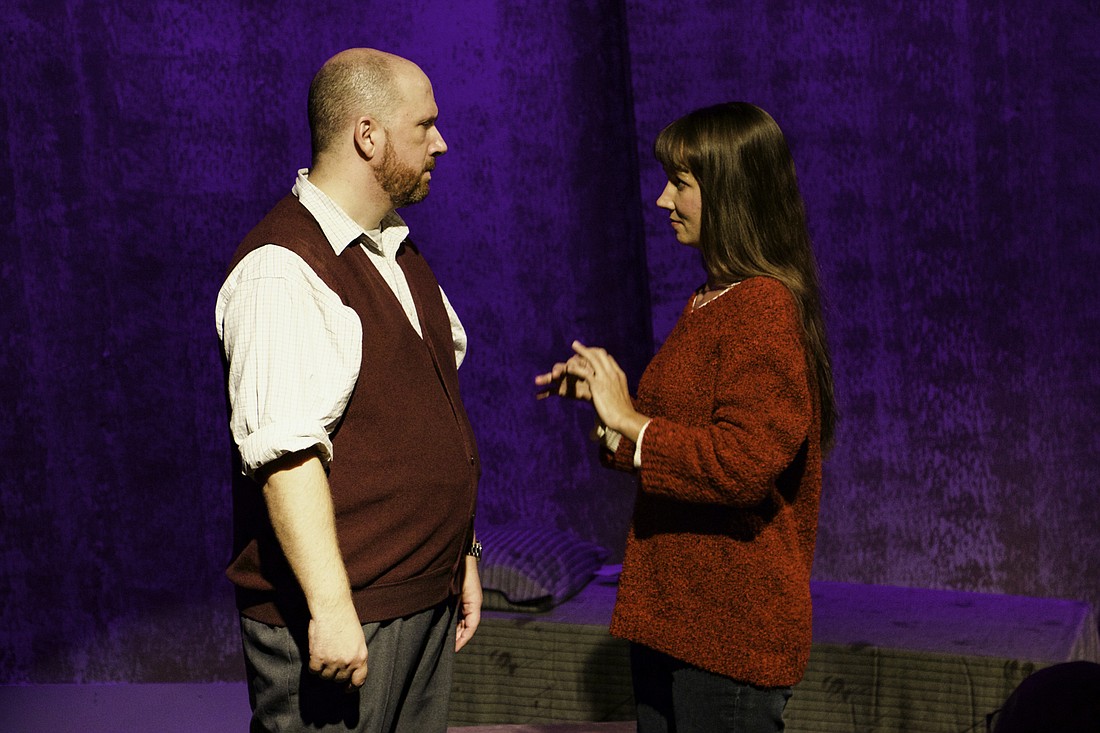- November 23, 2024
-
-
Loading

Loading

Mark Medoff’s “Children of a Lesser God” is a love story about a hearing man and a profoundly deaf woman. But it’s more than hearing boy meets deaf girl; it’s boy and deaf girl meet disability politics. Taking a sink-or-swim strategy, the play drops you into the political pool and let’s you figure it out as you go along.
The play unfolds in a school for the deaf in 1979. (An unnamed academy, possibly based on Gallaudet University.) James (Jason Kimble), the new speech therapist, is saddled with Sarah (Corinne Woodland), a problem child who’s no child. By the time they meet, Sarah is 27 and keeping her place at the institution by working as a maid. James gets the job of teaching her to speak and read lips—after all his predecessors have failed. Sarah refuses to learn on principle; if she can’t do something well, she won’t do it at all. She’s eloquent in sign language, and figures that should be enough. James and Sarah’s ensuing “speech therapy” sessions resemble debate sessions. (They talk to each other in sign language; James speaks Sarah’s words out loud. Not 100% realistic, but it lets you in on the conversation.)
James tries and tries again to teach her — then gives up. Who cares about speech therapy when you’re in love? James’ awkward therapy turns to clandestine dates, and what looks like creepy stalking. Fortunately for him, the loving feeling is mutual. James and Sarah finally get married and move into faculty housing. They enjoy about five minutes of wedded bliss. Then the headmaster (Ken Basque) and Sarah’s firebrand, hard-of-hearing friend, Orin (Killam Johnson), show up. They’ve got bad news. But James refuses to translate it into sign language. “Living happily ever after” seems unlikely.
I’ve seen this play (and the 1986 film adaptation) more times than I can count. Director Kelly Woodland acts like she’s never seen it before. In lesser hands, this is a one-note play — the note of anger. In Woodland’s hands, it’s a love story about two damaged people. The anger remains, but there’s more to it. Her take is nuanced.
Corinne Woodland has a lovely, mobile face, with eyes that speak volumes. I don’t mean she telegraphs her emotions; she feels what her character feels and expresses it without words. A subtle distinction — but it’s the difference between acting and pantomime. Corinne’s Sarah is less angry than others I’ve seen. She signs fluently, but doesn’t shout with her hands. A fine, honest performance. (She’s the director’s talented daughter, in case you were wondering.)
Kimble’s James rises above the don’t-be strawman his character could easily turn into. He’s a guy with real feelings, not a political position with legs. Basque’s headmaster isn’t a moustache-twirling villain. He’s a man of principle—the principle of least effort. He does what he does because that’s the way he always does it. Johnson’s Orin has a wide-eyed “You’re either for us or against us” zeal for the needs of the hearing-impaired community. Maryann Byram is, in the word of Van Halen, “hot for teacher.” A good portrayal of an unflattering character. (Just to be clear: I have no problem with that. If every character’s flattering, it’s not an honest play.) Amanda Heisey’s lawyer character is just trying to do her job. Sadly, she’s — if you’ll pardon the expression — deaf to the needs of the community she represents. Kristi Auricchio plays Sarah’s mother in a fog of denial and evasion. Something bad happened to Sarah. Whatever it was, it’s not her fault.
Medoff’s dense clash of cultures and languages comes to life thanks to Ralph Nurmela’s Dutch-angle sets, Elaine Slough and Georgina Wilmott’s spot-on 1970s costumes, and Patrick Bedell’s naturalistic lighting design. And, of course, the work of sign language instructors Kristi Auricchio and Sherry Kessel. It’s a technically demanding play. Much like a high-wire act, the stroll above the abyss only works if it seems effortless.
But why beats how every time.
Woodland keeps her eye on the personal, and keeps politics in the background. That’s not so easy in the highly political (and slightly dated) second act. Summarizing the relevant issues is about as futile as outlining the 100 Years War on the back of a 3x5″ card. But here goes …
In 1970, American deaf education was a battleground. Two factions clashed. “Oralists” advocated mainstreaming deaf people into the general culture by teaching them lip reading and vocalized speech. “Manualists” stressed sign language, and respected the deaf community as a distinct culture. Sarah’s side goes without saying.
Sarah goes to war over “manualist” principles in the second act. She joins an anti-discrimination lawsuit against the school—which has never had a deaf headmaster. Or, for that matter, hired any deaf people for anything other than janitorial work. Sarah takes a stand—and her marriage takes a hit.
The world of deaf education has moved on since 1979. Politically, the play is old news. Personally, it isn’t. While the granular issues have changed; the core principle stands: Thou shalt let people speak for themselves. That commandment applies to the hearing and non-hearing alike.
“Children of a lesser God” is a play about what’s lost in translation. The truth at the heart of it never gets old.
For what it’s worth, the 1986 movie inspired a real-world revolt at Gallaudet University in the following year. The university’s deaf students decided it was time to have a non-hearing dean. Life imitated art. The students were “heard.”
And they got what they wanted.